Topaasia® – Business Development. In content cooperation with Vincit. In an interview with Toni Mikkola.
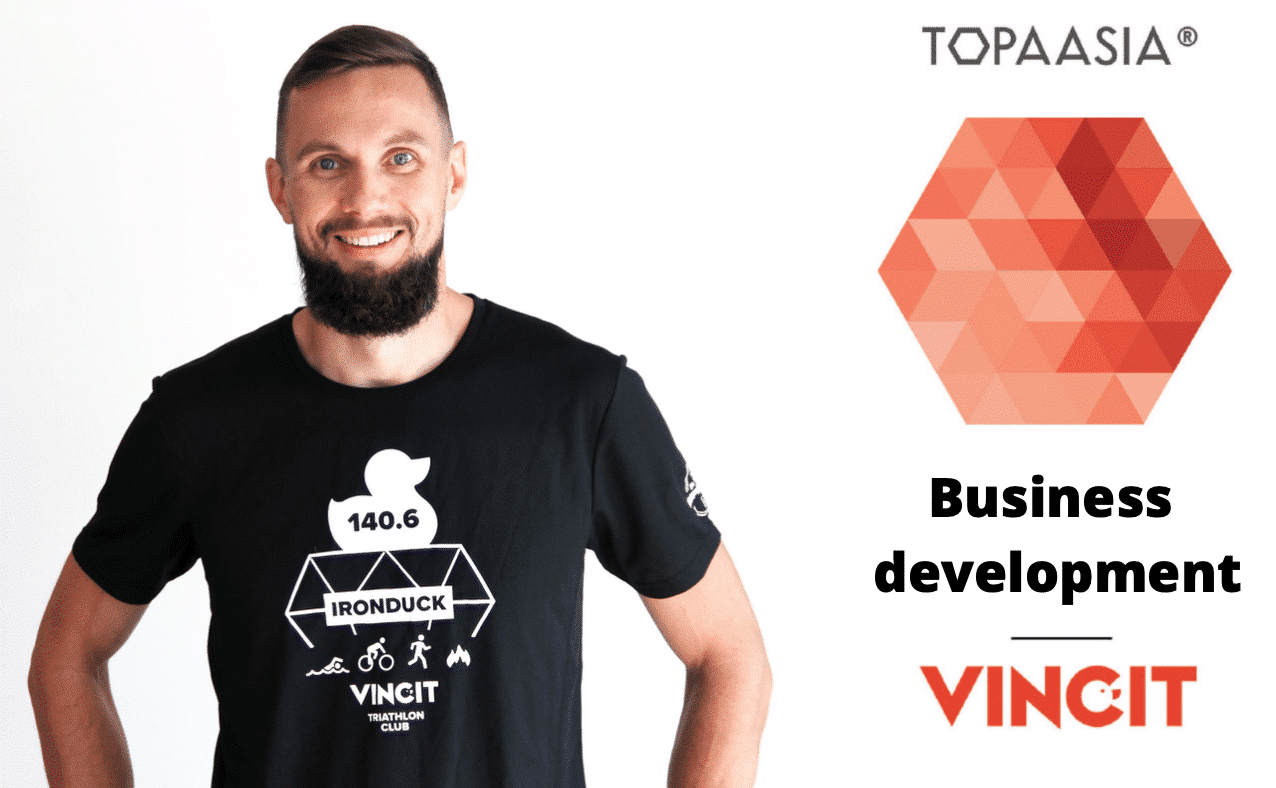
The latest Topaasia deck is called Business development and it is done in content collaboration withVincit. Business development is a deck made for management teams and other teams working with change and business development, which deals with the development of the existing business, the creation of a new one, the improvement of internal operating methods, and the ability to change. In the interview, one of the content co-operators of the deck, Toni Mikkola.
Why was this deck made?
Topaasia and Vincit have always shared a similar set of values. There are good past experiences of Topaasia games as well as of games made with Vincit:project start game and retrospective game . Both have found their place at Vincit, so it was natural to look at new areas for games.
There were actually two goals:
First , I was involved in sparring the Topaasia gang in what could be a good way to sell Topaasia® decks. It was then discovered that playing a suitable deck on a sales visit provided the customer with real solutions, experiments and ideas for the future. Playing brought up things that would not otherwise come up during sales or customer visits, and not necessarily even in the customer’s normal daily life. The customer was not left with any brochures or business cards, but really value-creating insights and ideas worth trying. Reaching such a valuable sales meeting is sadly exceptional. I believe that such a deck, especially when combined with digitization, offers an excellent tool to make the best out of the customer and the seller.
Second, the deck was not just for sales purposes. The deck is also intended to allow an easy approach to business development for companies that are either not used to doing it systematically or are stuck in old tools and processes. Boasted with digital perspectives or not, the best idea in a company’s history can be generated with cards in hand in just half an hour.
For what groups would you see this deck as good and for what situations?
This deck is made for working management. In large companies, this is a management team level pack, or in smaller companies even a general pack. The deck is exceptional in the sense that it comes with extra perspective cards to take digitality into account. Especially at the digital angle, the game can provide an easy platform for a digital conversation that feels difficult. Compared to an outside consultant, the deck is a surprisingly advanced and at the same time easy step.
This game is thought-provoking. No new digital ecosystem, product, or service will emerge during the session, but it is guaranteed to bring up closer to things that could be taken to some sort of follow-up. On top of all that, the game prioritizes the things that really need to be addressed.
Business development – the deck’s frame of reference, ie the suites in the deck of cards
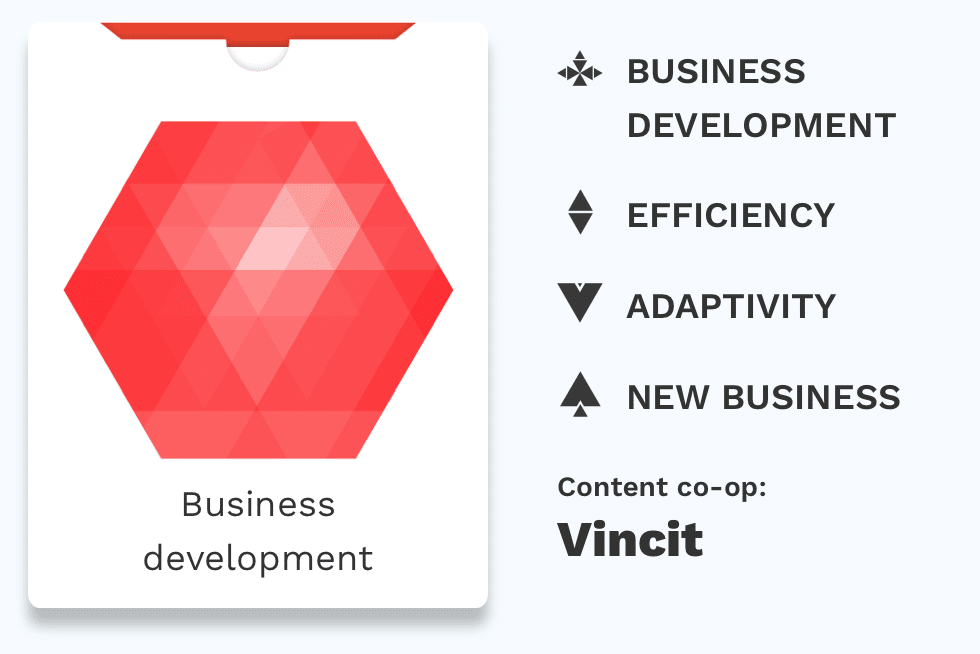
 Cross – Business development
Cross – Business development
This suite is associated with small opportunities. There are problems at the bottom that come up practically every day. Even though things are cursed and made aware, they are not dealt with at the same time. Is it really a problem or an opportunity and what is its importance? A practical follow-up and timetable must be agreed upon for the change. With this deck, those things need to be agreed or at least discussed and prioritized by the group.
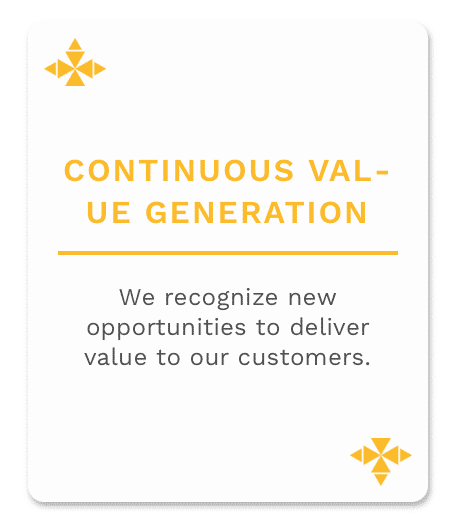
The favorite card from this suites is Continuous value creation – This is about identifying places for continuous value creation. Small stuff that hasn’t been thought about enough and that can create a whole new value or add value.
This card doesn’t necessarily mean a new business or other big openings, but things that can be done in everyday life right away. Some single little thing that is currently a burden on the customer e.g. in the purchasing process. It can even be reversed and that step is then even useful to the customer. As an example, even bringing this deck for my own customer visits. I don’t think I’m wasting anyone’s time as a guest, but this deck is one way to ensure a good-natured and fun meeting with a concrete positive outcomes.
 Diamonds – Efficiency
Diamonds – Efficiency
There are things in this suite for which small experiments are not usually arranged to improve them. Problems are just swallowed without taking action. For example, moving rows manually from one Excel to another, and you never have to take into account that it takes several person weeks per year. In every organization, there is too much of this extra “fat work”.
Then why aren’t the little things that affect efficiency fixed more often? It’s a lot because of the urgency and the fact that experiments are thought to be a time-consuming investment. Through the discussion that arises in the game, you can find really effective and simple experiments with things, in which the investment remains a small test for one person, e.g. “Asks someone, tries the same and spreads a positive experience”. The first step to improving efficiency can be a really quick thing.
Are there any examples from Vincit of how to view efficiency and its dips?
Take, for example, Vincit’s sales process, which is good for both the organization and the customer, but there is always plenty of room for improvement. It is sometimes cursed not to be able to put an offer to a customer when a suitable coder cannot be found. Sometimes the sales process gets an extra round of questions and a week’s delay. There will be something in almost every case. Something drags and people then make observations about these random glitches. But when those observations are separate, one does not find the focus area where it could be corrected very quickly.


Favorite cards from this suite:
Tools – An easy experiment to increase efficiency is to switch from one tool to another. Why e.g. are certain things being communicated via email when there might be another way to deal with them?
Flow efficiency – This is my personal favorite. In many cases, easy profits are available from your own schedule and customer experience when you think about what happens from the moment a customer asks us something, to the moment we get to produce valuetogether with the customer.
 Hearts – Adaptivity
Hearts – Adaptivity
If the ability to change is limited to digital development, we at Vincit talk about digital maturity. There are companies that are on baby-level, in which case the launch of digitalization should start with the creation of capability, even to some level. Then again, there are companies with really high digital maturities. There are customers for whom we almost have to admit they are higher than we are ourselves.
This deck guides you to identify the level of development of digitalization. The impediment to development may not be that there are no ideas or some sense of possible solutions, but they do not know how to seize them, do not find courage, or do not put enough time and resources into them. E.g. Assessing ROI will certainly bring courage to many, but seeing it is also an ability.
How has Vincit’s transformation been reflected in the rapid growth, has there been pain?
There is always pain, change is present anyway. We look at it boldly and without fear. Don’t be afraid of tomorrow, this is also involved Our Good Morning Manifesto . Courage, learning from failures and a willingness to experiment. They are clear things to us that ease a lot of the pain of growth. They are also at the heart of the ability to change.
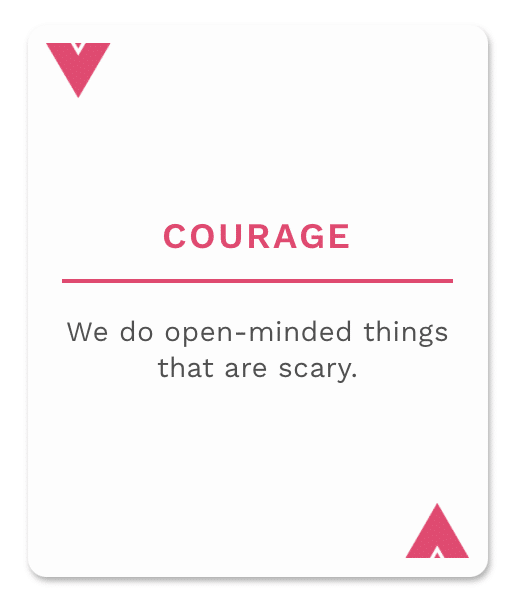
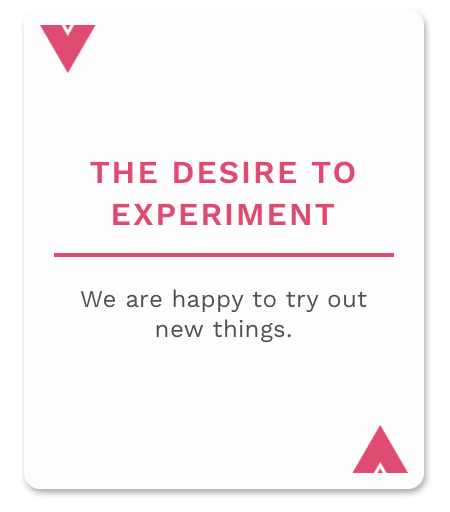
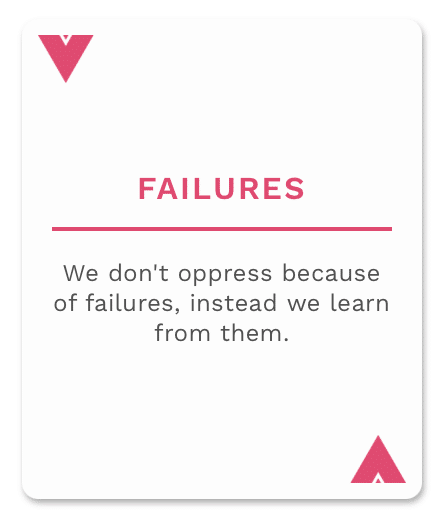
There are three favorite cards in this suite: Courage, willingness to experiment and failures. You need to have the right attitude to these things in order to be on the right track with the ability to change.
 Spades – New Business
Spades – New Business
You come to this suite after making bold openings and preparing for tomorrow’s world. Not to stay in place, but to see what might happen in the world. This in itself is a more radical counterpart for moderate “business development” – suite The purpose of this suite is, if not directly to create giant new ideas, then at least to create industry and business scenarios of what might happen in business and in what timeframe.
What kind of organizations succeed or fail in developing a new business based on your experience?
Those who succeed are not locked in where they are now. That is the main difference between what is. At best, things are frighteningly rethought. Even one’s own current business is treated disruptively in a certain way. It is also understood that in any case, over time, the world, customers and competitors will change so much that we must stay boldly involved. Company that does not think of any possible new, even radical alternatives to what it has to offer or how to do it gets stuck.
Can you think of any example company or customer that would have been particularly successful in creating this new business?
From my customers I appreciate Technopolis UMA – coworking space . They did not stay to fight the trend, but set out to build another business model. UMA has a strong customer experience and platform ahead of you compared to renting space between walls in another location. At UMA, you make yourself a flexible work platform. Everything is basically “conditions as a service”.
New businesses often involve digitalization. How will companies view the opportunities for digitalization in 2019?
In general, we are in a situation where there are a lot of companies that do not know how to think about digitalization very structurally and systematically. It is known that something needs to be done, but it is thought of in a limited way around an existing business. There is no violaing basic assumptions at all on the basis of existing business. Is it worth building a digital on top of it or do you have to rethink the whole thing? The scarcity of options characterizes thinking.
If you think about Topaasia games and you would just be locked into selling them and digitalization would only mean selling them in an online store. That’s a small distribution channel supplement that can be significant for product sales, but it doesn’t create a new business or break existing assumptions. But then when you think about that the game could be digitized in its entirety , so it is an idea from a different world because there is a fear that it may eat into an existing physical product business. On the other hand, it has the ability to scale to remote teams and the world in a very different way than physical decks.
In terms of digitalization, different businesses define expectations for companies. People benchmark completely different customer experiences for different things. Nowadays, you can easily and smoothly order food on your mobile phone. It contributes to a critical attitude e.g. to some malfunctioning accounting service app. If you have bad software, then it’s not enough that it’s a little better than a competitor because people generally use really good software.
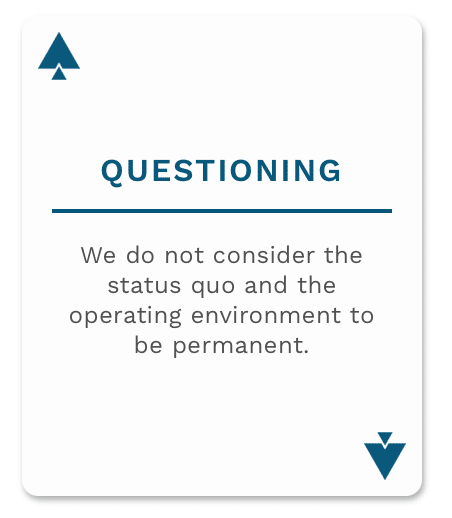

Favorite cards areQuestioning and Trends . After all, there shouldn’t really be people in a company’s management and development roles who don’t question the existing space and operating environment, but there are those who don’t take action. Questioning is strongly associated with both micro- and macro-trends, which are easily left behind in operational matters. In these, one must first reach the level of consciousness and then action.
—
Thanks Toni!
You can connect with Toni On LinkedIn and On Twitter.
Check out Vincit Website t , Linkedin , and Twitter.
Order Topaasia® – business development serious gamefrom our online store.
You can also find other decks made with Vincit in our online store:
For project starts made game Successful project.
Retrospectives n made the game Retrospective.
You can also ask more or order games from gamer Jussi Gallta by email jussi@topaasia.com or by calling 0400246626.



 Diamonds – Efficiency
Diamonds – Efficiency Hearts – Adaptivity
Hearts – Adaptivity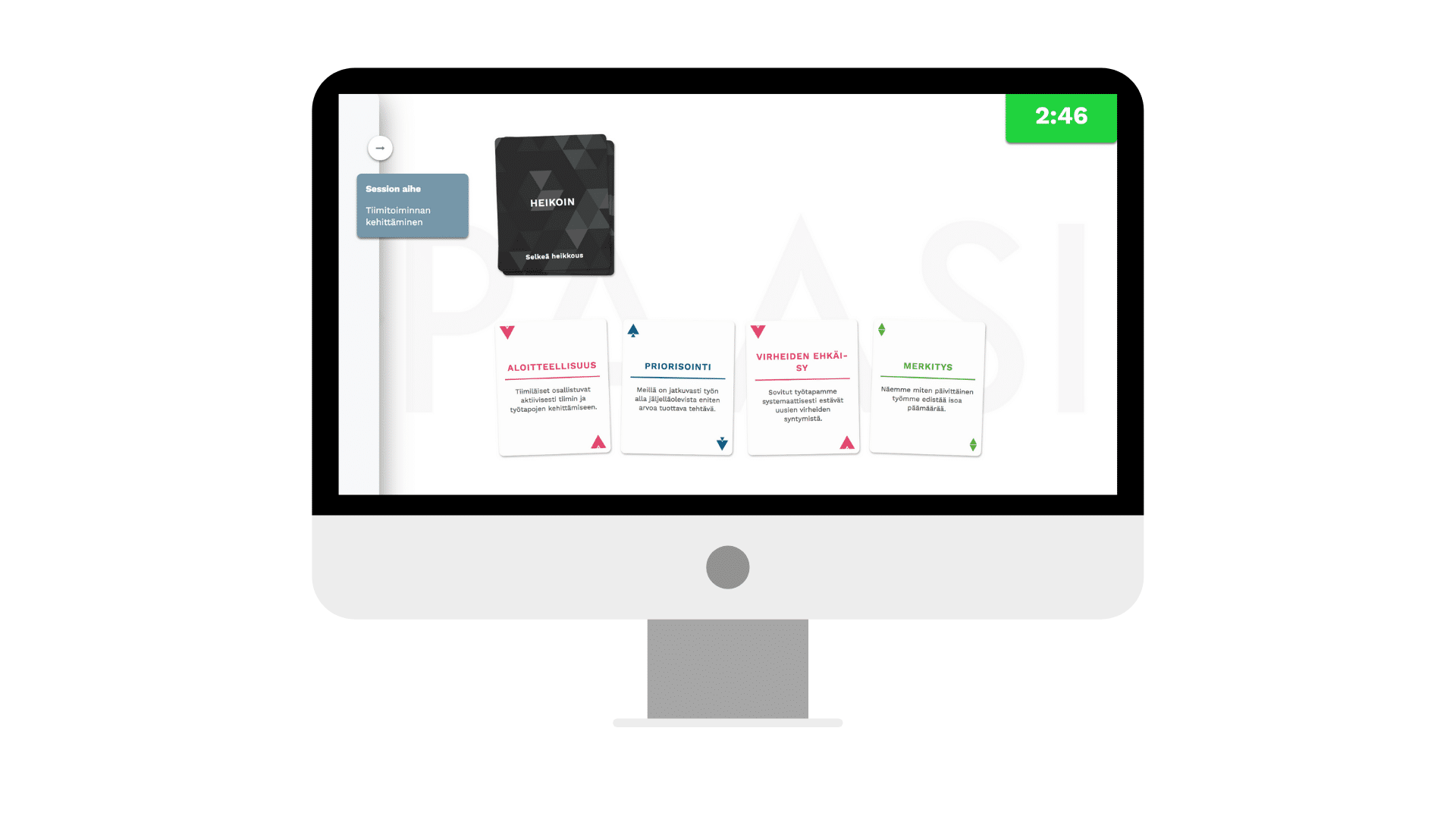
 Spades – New Business
Spades – New Business